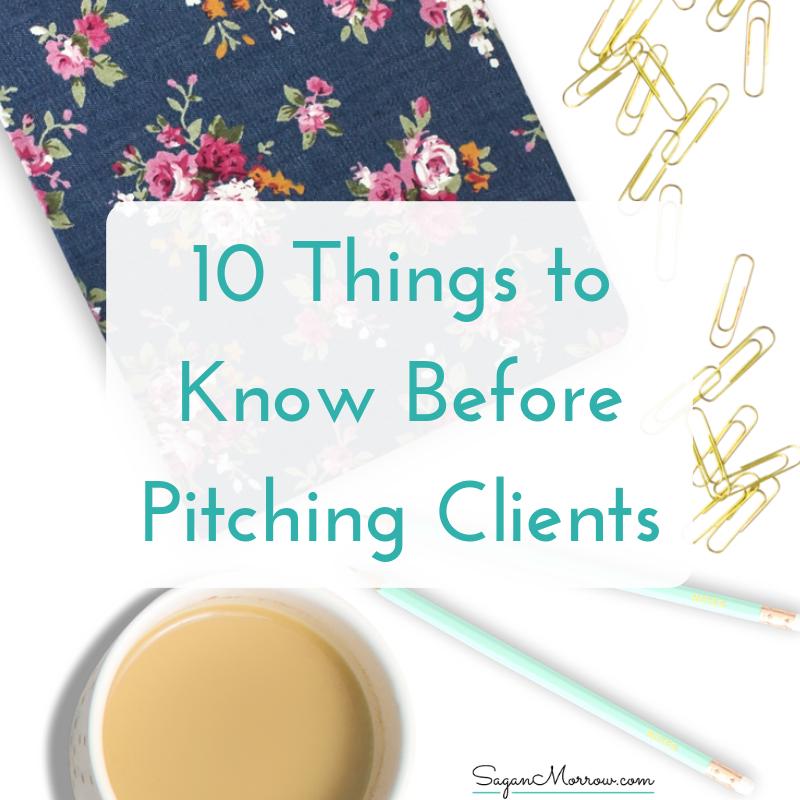So you’re getting ready to go in for the pitch… but are you prepared for pitching a client? There are a few key things you need to know before you pitch clients!
Getting clients for your freelance business goes something like this: first, you identify your ideal client and build a prospect list. Then, you cultivate relationships with clients, prepare for the pitch, and make the pitch.
(And then there’s a whole follow-up process.)
But many freelancers skip over the preparation part, and leap right into the pitch… and they wonder why their pitch isn’t successful.
Today we’re going to go over the 10 things you NEED to know before you pitch clients.
Here are 10 things you need to know before you pitch clients:
1) The specifics around services and packages you offer.
You need to know your freelance services inside out! What kinds of services do you offer with your business? Do you have package options? How flexible are your services and packages to be customized for individual clients? What kinds of services do you NOT offer?
Be very clear with yourself about all of these details.
Psst… here’s why you need a niche.
2) Ranges of rates for your services and packages.
You don’t need to have definitive numbers for each service/package (because there’s a good chance they’ll vary, depending on a client’s unique needs). However, you should have baseline and stretch amounts. Your prospect will undoubtedly have questions about pricing!
Here’s what you need to know about pricing services.
3) Why your services are right for this client.
What do you know about this client? It’s important to do your research. Identify what problems your client is facing and how your services provide a solution. You can probably get a good sense of what their goals are with their business when you do your due diligence ahead of time, so you can go into the meeting feeling confident that your services are exactly the right fit for this prospect.
4) Why YOU will be a good fit for this client.
Just because your services are a good fit for the client, doesn’t necessarily mean you’re the right person for the job. It’s important to look at this prospect’s values and how you will mesh with them. 
Do you have some kind of background or connection to this client? Is there something about you that sets you apart from someone else who could also provide this service?
For example, I have had the opportunity to work on projects in the health industry many times over the years. This was a perfect fit for me: I had a healthy living blog for many years, wrote a health column for a local newspaper, was a Certified Holistic Nutritionist, and had experience writing about health for a national magazine. The more that I gained experience in the field, the more that I kept getting more and more work in the health industry. Potential clients trusted me that much more because I already had a strong background and understanding of their work.
Of course, you don’t necessarily need to have a ton of experience in the industry to be the right person for the job! If you share the same values as your client, or if your personalities fit well together, that can be enough to make you the perfect fit.
5) Approximate timeframes and deadlines for accomplishing projects.
The client might not have firm timeframes and deadlines, but you should know in your mind roughly how quickly you could theoretically turn this project around.
How long does it take you to work on a project? What are some things that could come up that might derail your plans? It’s always better to suggest a longer timeframe and submit your work before the deadline, than to promise a shorter timeframe and not be able to make that deadline.
6) What a rough contract would look like.
You never know what kinds of questions your prospect might ask you at the pitch meeting, but you can still prepare as much as possible for the unknown. Even having a sample contract, or knowing ahead of time what your contract will include, can be useful before you pitch clients.
7) Questions you want to ask the client.
It’s a smart idea to go into your pitch meeting with a series of thoughtful, intelligent questions for them. Write these down ahead of time so you don’t forget about them. They’ll appreciate it if you are genuinely interested in their work!
The pitch meeting is much more about listening to them and understanding them than it is talking about your own services.
8) What you’ll do if it doesn’t end up feeling like a good fit after all.
Sometimes we have a prospect that seems as though they’ll be PERFECT for our services… but once you actually sit down and start meeting with them, some red flags go off. What are you going to do if that happens? Do you have an exit strategy in place, just in case?
9) Answers to their possible questions.
The more that you pitch clients, the more that you’ll see similar types of questions come up again and again. These could be related to your qualifications, past work experience and samples, the process of working with you, and so on.
Having pat answers for these questions (especially the ones that might be more challenging for you to answer!) is very important.
10) How you’ll wrap up the pitch meeting.
Do you have a plan in place for ending the meeting? Your prospect probably has no idea where to go from here (after all, that’s why they’re hiring you, the expert!). That means it’s up to you to suggest to them what the next steps are.
Have a rough action plan in mind so you can wrap up the pitch meeting with confidence and authority, and so that your prospect feels as though they’re in capable hands with you.
Ready to DO it?
Now that you have a good idea of what you need to know before you pitch clients, it’s time to go ahead and DO it!
You’re not going to bring in an income unless you have clients for your business, after all… and your clients aren’t going to magically appear out of thin air. You have to actively pitch them if you want that awesome gig!
Don't worry—you don't have to go it alone!
Build your confidence, improve your productivity, and prepare your business for sustainability as more clients come in, inside the Productivity Powerhouse e-course.

[…] to make your pitch? Here are 10 things you should do ahead of time for an extra confidence […]